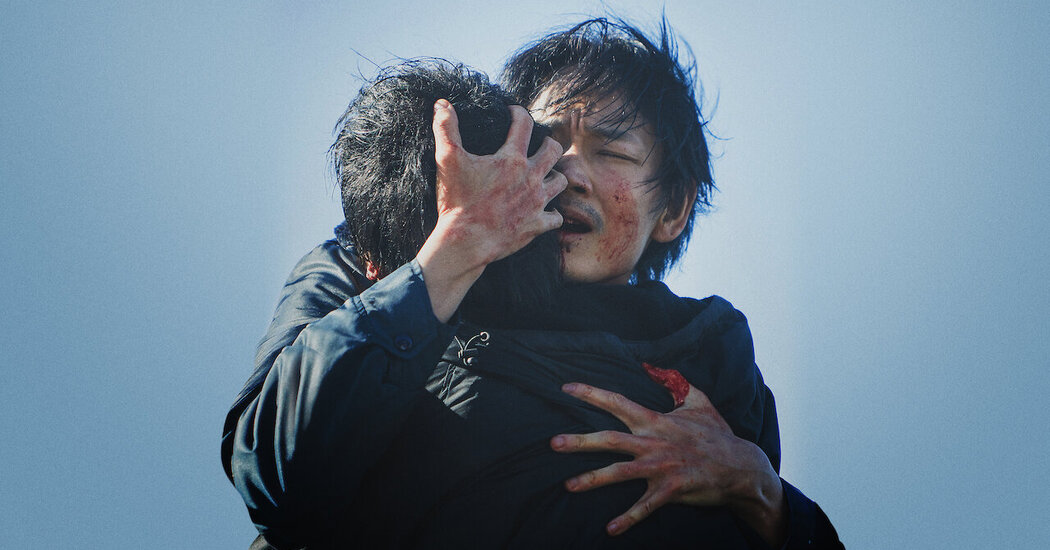
‘A Family’
Turning away from the portrayal of Yakuza as reckless renegades guided solely by blood lust, Michihito Fujii’s “A Family” paints the mobsters in a different, melancholic light. Known by many as Lil Ken, Kenji Yamamoto (Go Ayano) discovers family, brotherhood and a surrogate father when he joins the rough and tumble gang belonging to the crime lord Hiroshi Shibasaki (Hiroshi Tachi). We follow Kenji throughout the years, beginning in 1996, as he ascends from loyal enforcer to top lieutenant. Kenji ultimately lands in prison because of retribution against an assassin who targeted Shibasaki. When he is released 14 years later, Kenji must adjust to a changed world.
While “A Family” features familiar violence, it’s the tragic undertones applied to Kenji that are most gripping. The aged mobster finds his gangland family has fallen on hard times, and now, being a Yakuza is a scarlet letter that promises the bearer a lonely, impoverished life. Can Kenji reunite with a lost love by leaving this life behind or will his past hold him back? It’s a critical question with a poignant answer that sheds new light on the Yakuza image.
‘AKA’
A special forces soldier turned assassin: Adam Franco (Alban Lenoir) isn’t the kind of man you want on your tail. That much is apparent in the opening scene, when Adam infiltrates a terrorist cell in Libya by allowing himself to be taken hostage. Once in the cell’s hide-out, he breaks free and rampages through rifle fire to get to his real target, a whistle-blowing journalist the French government wants dead. Upon his return to France, he’s hired by the government to locate Moktar (Kevin Layne) — a man accused of a recent terrorist attack at a Parisian hospital — by becoming a bodyguard for a powerful drug dealer who purportedly has ties to Moktar.
In Morgan S. Dalibert’s ruminative film, Lenoir — best known for the “Lost Bullet” series — is more than a bruising wrecking ball. His stoic face and hulking muscles give way to reveal his desire to protect the vulnerable: That ethos culminates when he descends into a cocaine den against a legion of dealers to retrieve a kidnapped kid. It finds further life when Adam rebels against the corrupt institutions that employ him.
‘How I Became a Gangster’
A mobster epic in the vein of “Goodfellas,” the Polish director Maciej Kawulski’s “How I Became a Gangster” follows a kingpin affectionately known as Chief (Marcin Kowalczyk) through three decades, from an adolescent bully to leading his own crime syndicate. Chief builds a life of splendor upon drugs, robbery and intimidation. He hides that life from his working-class parents — they think he works at an auto shop — and his quiet wife. Everything would be perfect if not for his best friend Walden (Tomasz Wlosok), a loose cannon with a raging coke habit, who brings unnecessary attention to the surprisingly quiet business.
Kawulski records Chief’s rise and fall with an intoxicating sheen: The cinematographer Bartek Cierlica offers slick lighting, the film’s editors give the high jinks — such as a carjacking slowed down to the speed of molasses — a kinetic rhythm. The poppy soundtrack (featuring needle drops like The Ronettes’s “Be My Baby” and Alphaville’s “Forever Young”) also imbues his big life with a lively spirit. While you know there’s only one way this can end, it’s still an invigorating ride to witness.
‘On the Edge’
The pleasure of a heist film often arises from watching the thieves’ precise planning culminate in a successful job. In Giordano Gederlini’s taut thriller “On the Edge,” however, the heist has already happened, and everyone is dead. One of the deceased bandits is the son of the train operator Leo Castañeda (Antonio de la Torre). While trying to piece together his kid’s demise, Leo learns that the gangster who hired his son for the heist wants the stolen loot; the investigator, Virginie (Marine Vacth), whose boyfriend was undercover in the gang, is looking for an explanation for her missing man as well.
As is common in the genre, Leo is more than his humble appearance implies. A former cop, he immigrated to France from Belgium to start a new life with his son. Interestingly, Gederlini doesn’t immerse us in Leo’s tussles with possible witnesses. The director opts for lens flares and a distant approach that intimates Leo’s unmoored emotions. In the visuals of “On the Edge,” you get more than a revenge tale, you feel how a father’s unbridled grief translates to an unquenchable rage.
‘One Day As a Lion’
The second you see Jackie Powers (Scott Caan) sitting nervously in his car outside of a diner, you sense he’s not accustomed to this work. Jackie has been enlisted by the local hoodlum Pauly Russo (Frank Grillo) to murder Walter Boggs (J.K. Simmons) for an unpaid debt. When Walter arrives on his horse, however, Jackie is clearly intimidated: He storms the diner and accidentally kills the cook, but not a fleeing Walter. Rather than leave empty-handed, Jackie takes the caustic waitress Lola (Marianne Rendón) with him.
In John Swab’s movie, Jackie must evade a wrathful Pauly and persuade Lola to ask her rich mother for money so he might hire a defense attorney to spring his young son from juvenile detention. Caan and Rendón are a smart double act as they fall in love and trade dreams of absconding to Costa Rica. Amid the threat of death, the pair find belonging in a film brimming with thousand-yard stares and witty banter.













